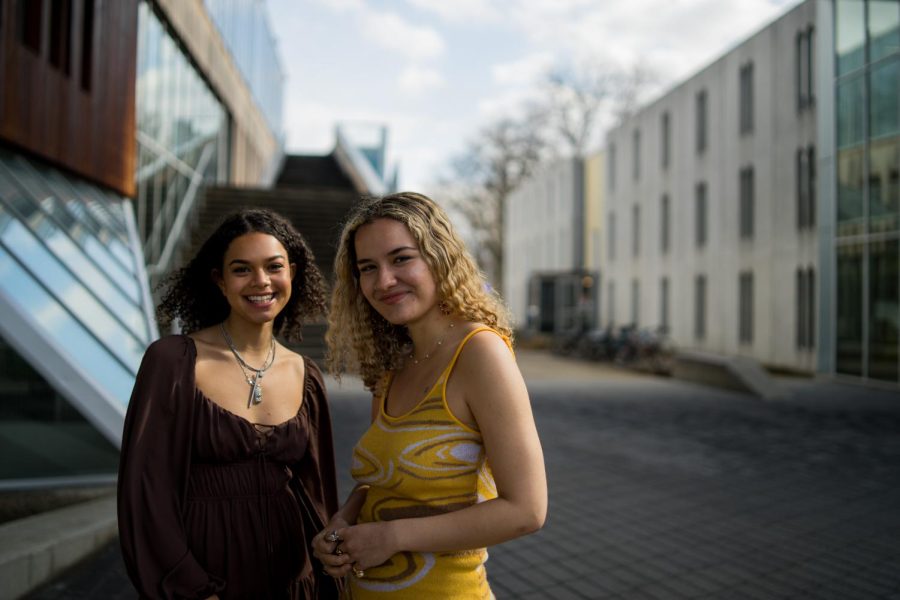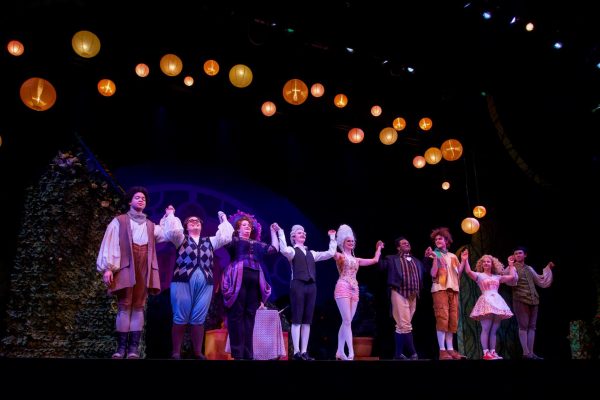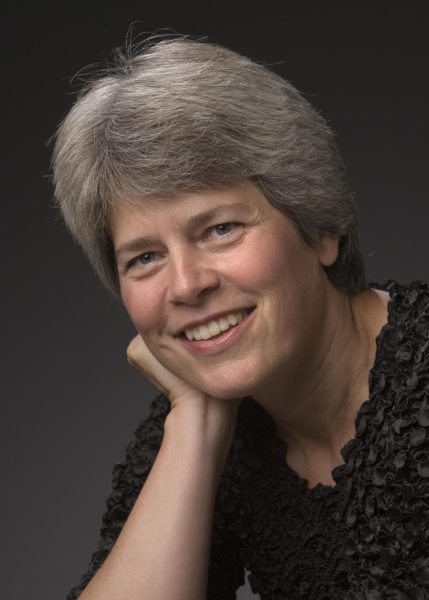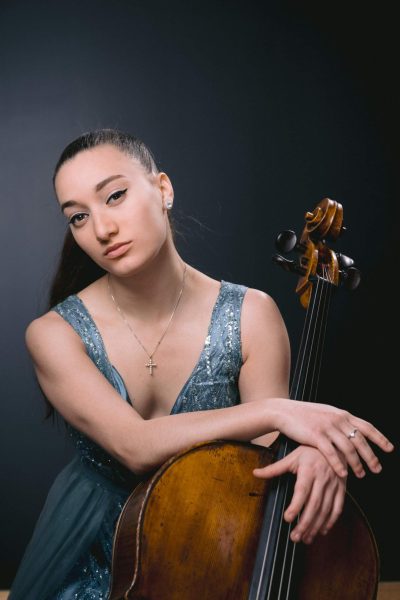The Crimson Collective Centers New Voices
Gabi Allemana, right, Marley Howard, left
The Crimson Collective, known formally as the Oberlin Femininity and Black American Music Collective, is the creative brainchild of double-degree second-year Jazz Vocalist Marley Howard and double-degree first-year Jazz Vocalist Gabi Allemana. The Collective seeks to center the artistic voices and sounds of women and nonbinary jazz musicians in an effort to promote greater inclusivity in the jazz field.
This interview has been edited for length and clarity.
Could you talk more about your backgrounds and how you came together at Oberlin?
Gabi Allemana: My dad was a professional musician, and that’s what got me into music. I was in this choir in Chicago for 10 years, and I really didn’t get into jazz singing until the year before I applied here. We were all in the Oberlin 2025 page, where Marley found me and was like, “Oh my gosh, Jazz Voice.” I contacted her and asked, “So why did you transfer?”
Marley Howard: I left the conservatory that I was at and came to Oberlin. I wanted a do-over of my first year. And then I saw Gabi and I was like, “Oh my God, she’s a Jazz Voice major.”
GA: And then our first day, we had this jazz student first-year pizza party on the roof of Kohl Building, and I saw her and just darted to her. I was like, “Hi, I’m Gabi.” We instantly gravitated toward each other and have stuck to each other ever since.
Your group is a fairly recent invention. What kind of timeline did you operate from, and how has the planning and organizing experience been, especially over Winter Term when much of this took place.
GA: We decided to launch the Crimson Collective during that time. We talked to La Tanya Hall, associate professor of Jazz Voice, who is our private teacher and advisor.
MH: I think we were having a bit of a rough time. I think Gabi was more frustrated with men in jazz. I remember we were both in the jazz keyboard lab and we were just like, “Let’s start a support group.”
GA: This was my first time dealing with jazz men, and I think that’s probably why I was a little bit frustrated.
You can decide how much you want to reveal, but when you say jazz men, was there a general feeling you got about them of not feeling supportive, or were there specific things that happened?
GA: It was kind of a mix of both. We’re both the only women in our ensemble. It was rough in rehearsals being talked over a lot. There were textbook microaggressions that we’d dealt with in school before, too. But also there were a lot of side comments from other cisgender men in the department. They would say to me that they didn’t really believe that I played an instrument as well as singing and stuff like that.
MH: You walk into a room and you’re like, “I don’t think they actually want me here.” And if they do want me here, is it because I’m a good musician or is it because they think I’m pretty? You’re constantly second guessing yourself. I left my previous school because of the misogyny and racism that I faced there.
What kind of resources did you draw on as inspiration and support to help build your organization from the ground up?
GA: A big part of what helped us create our group is this four-hour-long documentary from this group called This is a Movement, which is an organization that does similar things as us. They have discussions about gender and jazz and Black American music.
MH: There is also the “We Have Voice” collective I came across because there was a famous jazz musician who came and talked to me last year around December when I was struggling with being a woman in my Jazz department. She said, “Here, I’m a part of this group; it’s called ‘We Have Voice.’ We have this code of conduct that makes a zero tolerance policy for harassment of any kind.” That’s something that we were trying to implement here with Jay Ashby. Hopefully, it will be implemented across the entire department.
Could you talk more about what other kinds of resistance you have encountered in creating this group? I understand that you are hosting an upcoming roundtable discussion, and you recently clarified what the intentions of that discussion were.
MH: I think it could be threatening to have a group like ours come in and say, “I want to talk about these things.” Usually cis men aren’t ready for those conversations.
GA: The people in this department, being 90 percent cis men, grow really comfortable with each other and they don’t have to talk about these things all the time. And so they just decide not to think about it, which honestly, if I were them, I would do the same thing.
It’s an easy life to live, but there are more women and nonbinary folks joining this program and I think it’s useful for us to have this talk just to get them to acknowledge that they have to share the space with these people and that they need to make them comfortable. We’re not trying to scare people into feeling bad for us; we just want to make our lives easier.
Most of the resistance is coming from people we’re close to who feel open enough to just talk about it with us. They’re confused about what it is.
What are some examples of the rhetoric and behavior that made you say, “This is not okay.” I want to give readers a vivid understanding of what your experience has been.
GA: For me, it was a lot of talk about cancel culture here. People take that idea out of context sometimes — a cis white man says something in class that can be a little offensive. Then someone like Marley or me says, “Hey, just don’t say that.” And then another cis male will be like, “You’re gonna get them canceled because we’re white or we’re cis.”
I’m not trying to get you exiled from here. I want you to understand that this makes us uncomfortable, and you just need to look outside your own bubble to make space for us.
Also, their perception of weakness in music is often associated with what vocalists tend to do a lot: sing ballads — emotional, lyrical melodies — all the time. A lot of guys will hate that. They say, “You have to play fast all the time, you have to play all these notes, blow over all these changes,” just to be in a jam session and to show them you’re talented. Someone moving you to tears is not the same power for them sometimes. I hope we can get them out of that way of thinking.
Singing a ballad or scatting — improvisatory syllabic singing — the way a singer does is acceptable and also a huge component of the art of Black American music. I feel like that’s something that a lot of cis men tend to forget.
Is there anything else you would like to add?
GA: When we had our orientation in the Conservatory, we had this social justice in music training. They covered a lot on race and disabilities, and gave us scenarios asking us to react to, but I noticed, especially in a room of all Jazz majors, there wasn’t much talk about gender in the scenarios. A lot of the women and nonbinary folks end up being the only ones in their ensemble. I don’t think anyone else in the group is ever forced to think about that. Our plan is to kind of come up with a training for working with gender in our department.






